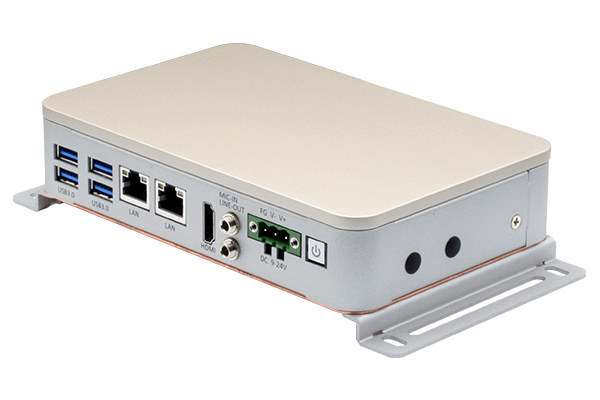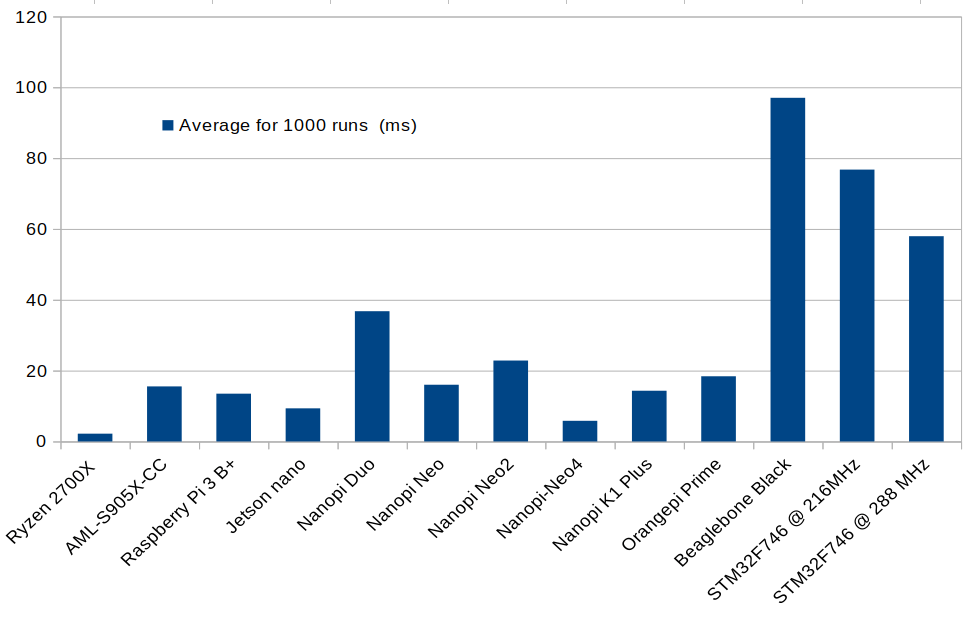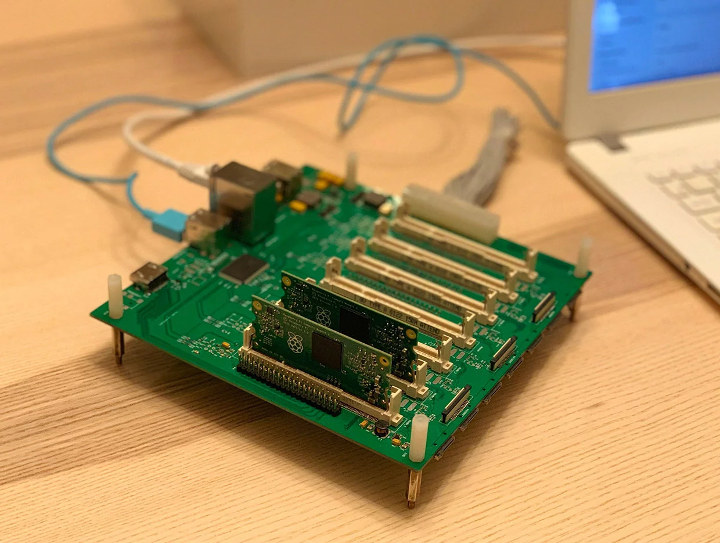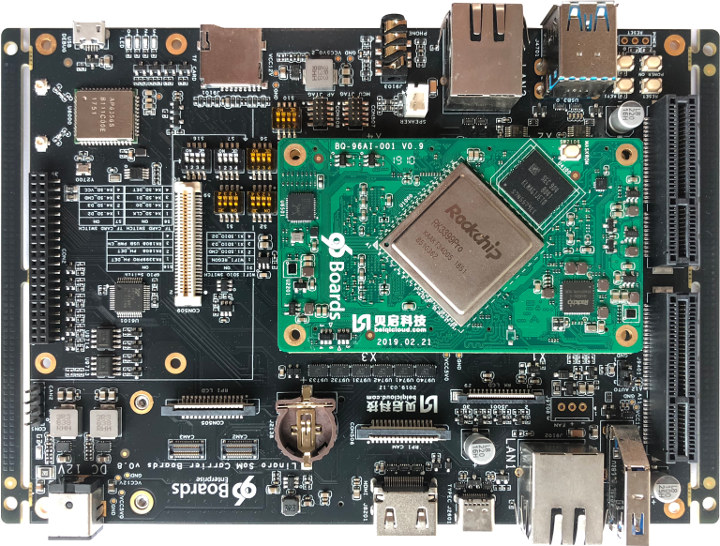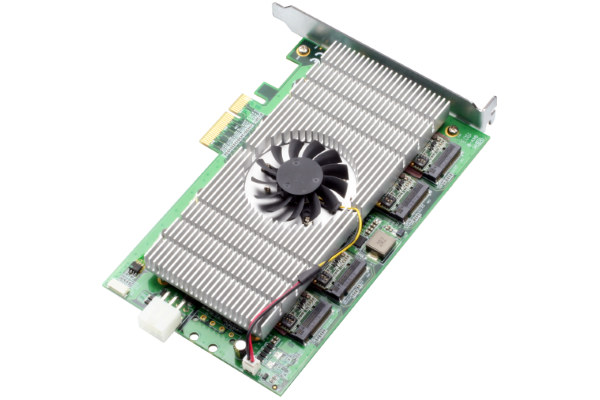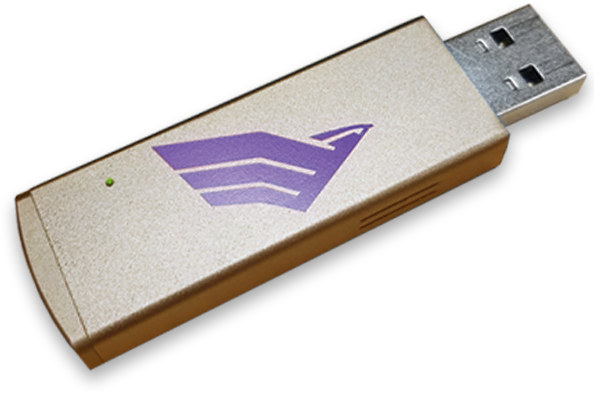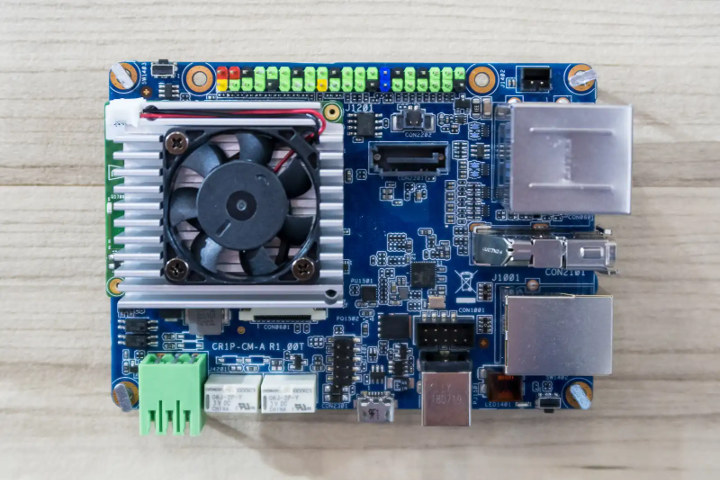We’ve covered several of AAEON rugged mini PCs part of BOXER-8100 family powered by an NVIDIA Tegra X2 processor and targetting AI Edge applications. The company has now introduced three new AI embedded computers for the same AI edge applications but using Intel processors together with Intel/Movidius Myriad X VPU (Vision Processing Unit) for AI acceleration. The three models are BOXER-8310AI, BOXER-8320AI, and the upcoming BOXER-8330AI based on respectively Intel Celeron/Pentium Apollo Lake processor, Intel Core i3 7th gen processor, and an Intel Core i3/77 or Xeon processor. I’ll focus on the Apollo Lake model in this post to introduce AAEON BOXER-8300AI family of rugged mini PCs. BOXER-8310AI specifications: SoC (one or the other) Intel Pentium N4200 quad-core Apollo Lake processor Intel® Celeron N3350 dual-core Apollo Lake processor System Memory – 1x DDR3L SODIMM slot supporting up to 8GB RAM @ 1867 MHz Storage Device – mSATA socket AI Module […]
TensorFlow Lite for Microcontrollers Benchmarked on Linux SBCs
Dimitris Tassopoulos (Dimtass) decided to learn more about machine learning for embedded systems now that the technology is more mature, and wrote a series of five posts documenting his experience with low-end hardware such as STM32 Bluepill board, Arduino UNO, or ESP8266-12E module starting with simple NN examples, before moving to TensorFlow Lite for microcontrollers. Dimitris recently followed up his latest “stupid project” (that’s the name of his blog, not being demeaning here :)) by running and benchmarking TensorFlow Lite for microcontrollers on various Linux SBC. But why? you might ask. Dimitris tried to build tflite C++ API designed for Linux, but found it was hard to build, and no pre-built binary are available except for x86_64. He had no such issues with tflite-micro API, even though it’s really meant for baremetal MCU platforms. Let’s get straight to the results which also include a Ryzen platform, probably a laptop, for […]
Arm Techcon 2019 Schedule – Machine Learning, Security, Containers, and More
Arm TechCon will take place on October 8-10, 2019 at San Jose Convention Center to showcase new solutions from Arm and third-parties, and the company has now published the agenda/schedule for the event. There are many sessions and even if you’re not going to happen it’s always useful to checkout what will be discussed to learn more about what’s going on currently and what will be the focus in the near future for Arm development. Several sessions normally occur at the same time, so as usual I’ll make my own virtual schedule with the ones I find most relevant. Tuesday, October 8 09:00 – 09:50 – Open Source ML is rapidly advancing. How can you benefit? by Markus Levy, Director of AI and Machine Learning Technologies, NXP Over the last two years and still continuing, machine learning applications have benefited tremendously from the growing number of open source frameworks, tools, […]
Turing Pi Clusterboard Takes up to 7 Raspberry Pi Compute Modules
We’ve already covered several cluster solutions based on Raspberry Pi boards such as Bitscope Blade with up to 40 Raspberry Pi boards, a 16 Raspberry Pi Zero cluster board prototype, Circumference “datacenter-in-a-box” with up to 32 Raspberry Pi 3 B+ boards. If you want something more compact, it makes sense to develop a platform with Raspberry Pi Compute Modules instead, and we’ve already published news about MiniNodes Raspberry Pi 3 CoM Carrier Board that supports up to to 5 Compute Modules 3/3+ last year. There’s now another option with Turing Pi Clusterboard support up to 7 Compute Modules for applications leveraging Kubernetes, Docker, Jupyter Notebook, machine learning (TensorFlow/Caffe), and serverless stack. Turing Pi specifications: 7x Sockets for Raspberry Pi Compute Module 3/3+ Storage – 7x microSD card slots Video Output – 1x HDMI port, MIPI DSI connector Audio – 1x 3.5mm audio jack Camera I/F – 2x MIPI CSI connectors […]
96Boards RK1808 & RK3399Pro SoM & Devkit Now Available for Purchase
Back in April, we covered the very first 96Boards SoM’s (Systems-on-Module) which were based on Rockchip RK3399Pro or RK1808 processors, and targeted applications leveraging artificial intelligence acceleration. There were not quite available at the time, but Seeed Studio now has both BeiQi modules for pre-order for $119 and $59 respectively, while the carrier board goes with $125 with antennas, and power supply. Note that the RK3399Pro SoM and the carrier board are basically available now with shipping schedule for July 4th, but you’d had to wait until the end of the month for the RK1808 module. BeiQi RK1808 AIoT 96Boards Compute SoM Module specifications: SoC – Rockchip RK1808 dual-core Arm Cortex-A35 processor @ 1.6 GHz with NPU supporting 8-bit/16-bit operations up to 3.0 TOPS, TensorFlow and Caffe frameworks; 22nm FD-SOI process System Memory – 1GB LPDDR3 (I also read “4GB LPDRR3” (sic.) in other places, but the capacity is likely […]
AAEON AI Core XP4/XP8 PCIe Card Combines up to 8 Myriad X VPU’s
Movidius Myriad X is Intel’s latest vision processing unit (VPU) first unveiled in 2017, and available for evaluation in Intel Neural Compute Stick 2 since the end of 2018. Later on, AAEON also launched their own AI Core XM2280 M.2 card equipped with two Myriad X 2485 VPU’s and capable of up to 200 fps (160 fps typical) inferences, thanks to over 2 TOPS of deep neural network (DNN) performance. But what if you need even more performance? The company has now launched AI Core XP4/XP8 card with either two or four AI Core XM2280 M.2 cards that can be connected into any computer or workstation with a PCIe x4 slot. AAEON AI Core XP4/XP8 specifications: 4x M.2 sockets for 2x or 4x M.2 2280 M-key cards with 2x Myriad X VPU’s and 2x 4Gbit LPDDR4x memory each Asmedia PCIe switch Cooling – Fan heatsink PCIe x4 standard full-length low […]
$69.99 Gyrfalcon 2803 Plai Plug Delivers 24 TOPS per Watt
Last year we covered an alternative to Intel Movidius Neural Compute Stick with Orange Pi AI Stick 2801 powered by Gyrfalcon Lightspeeur 2801S neural processor, and delivering up to 5.6 TOPS, or 2.8TOPS @ 300mW for $69. Since then Gyrfalcon introduced Lightspeeur 2803(S) AI accelerator delivering up to 24 TOPS, or 16.8 TOPS @ 700 mW. We’ve recently seen the new neural processor will be integrated into SolidRun i.MX 8M Mini & Nano systems-on-module, and today the company published a press release to announce their latest 2803 Plai Plug providing an upgrade to their existing 2801 Plai Plug (Orange Pi AI Stick 2801) for about the same $69.99 price tag. Gyrfalcon 2803 Plai Plug preliminary specifications: AI Accelerator – Gyrfalcon Lightspeeur 2803S with 2-dimensional Matrix Processing Engine (MPE) and AI Processing in Memory (APiM) Storage – eMMC flash Host interface – USB 3.0 port Power Consumption – 700mW at 16.8 […]
ASUS Tinker Edge T & CR1S-CM-A SBC to Feature Google Coral Edge TPU & NXP i.MX 8M Processor
A few months ago, Google introduced its Coral development board and USB accelerator powered by their Edge TPU delivering up to 4 TOPS and optimized for Tensorflow Lite. ASUS and Google have now partnered to bring more solutions powered by Coral Edge TPU namely ASUS Tinker Edge T board for makers and hobbyists, CR1S-CM-A SBC for industrial projects, and even a full computer fitted with a Google Edge TPU PCIe card. ASUS Tinker Edge T ASUS Tinker Edge T preliminary specifications: SoC – NXP i.MX 8M quad-core Arm Cortex-A53 processor with Arm Cortex-M4F real-time core, GC7000 Lite 3D GPU ML accelerator – Google Edge TPU co-processor System Memory – 1GB LPDDR4 RAM Storage – 8 GB eMMC flash Connectivity – Gigabit Ethernet port, Wi-Fi 2×2 MIMO (802.11b/g/n/ac 2.4/5GHz), and Bluetooth 4.1 Video Output – MIPI DSI connector, and HDMI output Camera I/F – 2x MIPI CSI 2 interfaces for stereoscopic […]


